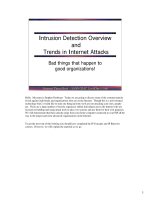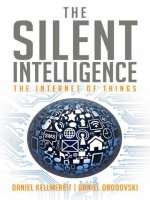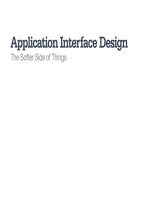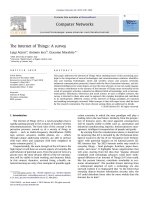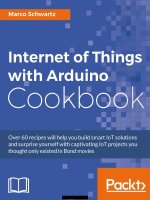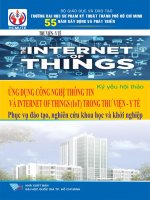Application intelligence and vision in internet of things (IoT)
Bạn đang xem bản rút gọn của tài liệu. Xem và tải ngay bản đầy đủ của tài liệu tại đây (269.14 KB, 5 trang )
International Journal of Computer Networks and Communications Security
VOL. 3, NO. 4, APRIL 2015, 151–155
Available online at: www.ijcncs.org
E-ISSN 2308-9830 (Online) / ISSN 2410-0595 (Print)
Application Intelligence and Vision in Internet of Things (IoT)
Mohsen Hallaj Asghar
School of Computer and Information Sciences, University of Hyderabad, Hyderabad, India
E-mail:
ABSTRACT
Internet of Things (IoT) is envisioned as billions of sensors connected to the internet through wireless and
other communication technologies. Recently IoT received much attention from scientists, industries and
governments all over the world for purpose of succeeding and achieving ubiquitous sensing wireless sensor
network technology for changing the era of our modern day living. This offers the capability to measure
and understand environmental indicators. Building or home automation, social smart communication for
enhancement of quality of life that could be considered as one of the application of IoT where the sensors,
actuators and controllers can be connected to internet. IoT can be represented as a main enabling factor of
promising paradigm for integration and comprehension of several technologies for communication solution,
Identification and integration for tracking of technologies as wireless sensor and actuators. The target of
this paper introduces the concept of several applications for internet of things and with the discussion of IP
for smart device that will arise as the future vision of internet of things.
Keywords: Internet of Things (IoT), Radio Frequency Identification (RFID), Electronic Product Code
(EPC), IP for Smart Device.
1
INTRODUCTION
The internet of things (IoT) is the novel paradigm
which has rapidly spread in the scenario of the
emerging modern wireless communication. IoT
represents a target and vision to extend the internet
into the real world by embracing the everywhere,
everyday objects [1]. Physical devices are not
longer disconnected from the virtual world but it
can be controlled remotely from anywhere and the
capability of device and physical item can act as
physical access point to the internet service
provider. Unquestionably the main consistency of
the IoT idea is the collaboration in high impact for
several aspects of everyday life and manner of
potential user. The most signally effectiveness of
IoT is introduction of the high impact that will have
a several aspect of daily and behavior of users.
From the view of private users, the obvious effect
of IoT will be in both scenarios, commercial and
domestic fields. IoT can assist the improve the
quality of life, e-health, industrial, social internet of
Things, agriculture, transportation, etc. Enhanced
learning of a few instances of possible application
scenarios in which the new paradigm will be useful
for role of the IoT in near feature. Similarly, from
another perspective for business users the most
obvious consequences will be bright future in
industrial automation, logistic, and quality of
business management for smart transportation of
assets and goods. McKinsey Global Institute
announced by 2025 internet endpoint will touch
every physical things around, furniture, cars,
personal device and more. It’s highlight future will
be arise as a combination of technology with the
interaction of human environment and extension
diffusion of the internet of things. ”Smart” objects
play the main roles in the IoT vision [2]. Whereas
the information technology and embedded
technology would have potential to revolutionize
the usage of objects. By using the sensor, they are
capable to understand the context and would be
able to communicate with each other “Digitally
upgrading” ordinary nature of object, this would
enhance their physical function by adding ability to
digital object[3]. Precursor development are more
and more obvious today such as washing machines,
exercise bike, electric toothbrushes also smart
152
M. H. Asghar / International Journal of Computer Networks and Communications Security, 3 (4), April 2015
metric are occupied with the network interface.
Another application domain in IoT, will estimated
the internet connectivity of everyday objects which
can be used and tracked remotely from anywhere.
The data will collect-up by readers from physical
object from anytime to analyze the data and will
send in to the cloud smart device. This enables
many aspects of real world which can be observed
as unattained level of details at trivial cost. The use
of word internet in term of internet of things, which
stands for vision above can be seen either simply as
a metaphor- in the direction of people used in the
web, objects will soon communicate with each
other, use service, purvey information and generate
value or explanation in several technical sense, IP
protocol stack will be used by smart objects. The
term IoT was published by work of Auto-ID center
at Massachusetts institute technology (MIT), which
in 1999 started the prototype of RFID infrastructure
in 2002, the co-founder and former head Kevin
Ashton stated “we need an internet of things to
standardization of computer to realize the real
world” [4]. Nowadays the epithet of IoT is
rapidly increasing and academic, industrial and
people know that this is the emerging phenomenon
of new IT technology.
introducing the critical application in IoT which
play an important role in our life, III part presents a
significant vision in IoT, part IV presents the IP for
smart things that will be attach as new corporation
of IP as authentication and addressability for smart
device, part V presents the conclusion of this article
and finally VI shows presents the source and
references for contacts with the more information
about several aspect of this paper.
2
APPLICATION
There are several application domains which will
be compact by the emergence of internet of things.
The application can be classified into various
network availability, scale, coverage
(Figur1.Application of Internet of Things) and
repeatability of use involved. In figure.1 [6].We
categorize the application
relevant into five kind of domain, Personal
communication and home automation, mobile
communication, Enterprise and industrial, medical,
utilities.
Personal and home communication, IoT
products power usage data and make it available
to the house electricity. It’s for communication of
smart object through the ubiquitous power supply
for each node. Node is attached in things and it
should act as energy saver for home utilities.
Utility companies and enterprises can save the
energy and optimize in the industries, Mobile
customer can interact with smart device by using
communication with the intelligence cloud and
data center.
There wide range of applications in the field of
IoT, but we represent the important application
that have loop with our life and society. Here we
define these applications.
2.1 Home and personal communication
Fig. 1. Application in IoT
European Union and politicians initially used the
term in the context of RFID technology that they
tried to link the RFID with the internet of things as
key component of IoT. Finally in 2009 the EU
commission alluded to action plan ultimately saw
Internet of Things as general evaluation forum for
network of interconnected computers to the
physical cyber world as interconnected object[5].
Following the paper will define the II part
The sensor data collected is utilized only by
individual user and who directly own the network
connection. Usually Wi-Fi is access as backbone
for higher bandwidth data (video) also transfer as
well as higher sampling rate (sound). Control of
home appliances such as air conditioners, washing
machines, refrigerators, etc, will allowed for better
energy consumption and for the cost savings. User
appliance also can be benefited and optimize
energy reducing cost of living and create peace of
mind[7].The main purpose of home automation is
to control all smart device in the location of home.
Control of device will bring the satisfaction for
customer and owner. One of the greatest
advantage in home automation is that the user can
prevent disasters like fire, etc,. User can control
153
M. H. Asghar / International Journal of Computer Networks and Communications Security, 3 (4), April 2015
light and temperature by using the phone, tablet or
computer. Future of home automation can be
visualized as more security, comfortable, energy
efficient and convenient. Nowadays home
automation has become more and more affordable
by usage of operating systems which are less
complex, so owner can master the control of all
smart devices to order of security and safety [8].
2.2 Healthcare
Many benefits is provided by IoT technologies to
the e-health care domain. This scenario was
envisioned two decades ago. Recent activities and
scientists trying to give a perfect platform for IoT,
to realizing the sensor body and transfer data to the
server for analyzing information[9].
1) Tracking of objects and people (staff and
patients): is the target at the identification of
person or anybody with motion sensors, like
case patient monitoring improve workflow in
the hospital. Tracking in the motion is the vital
point in smart healthcare such as connecting to
the ambulance. Availability and maintenance
of material/equipment is another important
aspect, like during surgery such as blood
packets, etc,.[10].
2) Identification of
authentication:
patients
with
smart
It’s introducing the point identification for
prevent and protect of the patient from harmful
Accident such as (wrong drug , does and time).
For patient especially in case of aged citizens,
monitoring by comprehensive electronic
medical record is for analyzing the
maintenance and monitoring of the patients.
Both case of identification and authentication
are to improve the frequently used for
accessibility address of patient in urgent
moment and it useful for security process to
avoid of missing of the important data of
patients and surgical equipments.
3) Data collection from sensors:
Automatic data collection is one of the issues
in healthcare system. Data should be transfer to
the domain and analyzing data helps us to
reduce the processing time. This function is
relevant to the RFID technology. RFID must
collected data from RFID reader to the domain
of healthcare. Clinical application technologies
is with the purpose of the network and provide
the location of RFID for identification of the
patients location.
2.3 Industrial
Internet of Things (or) Network of Things within
the environment as an enterprise. Application,
information must be collected from different
actuator or sensors, used by the manager for
authorizing the person for release of the data. Social
internet of things keeps to track of the assets and
goods, sensors always been an important part of the
industrial in setting-up the security, climate,
control, etc[11]. By using sensors there are several
test beds implemented and it’s plane to get the
control of network enterprise and eavesdropping,
by using the secure channel can tke action against
of hackers between enterprise in different location.
Nowadays some important part of enterprise and
governments are facing with the hacking, such as
military, nuclear power plant, by using the specific
categories of smart sensors and actuators can be
protect their assets form attackers.
2.4 Utilities
The information from the network in this
application domain is almost for service operation
and optimization of consumer for customer.
Already being used by utilities organization such as
(smart metric) for calculate of the optimize cost.
This utility has several extra expenses about the
reading and analyzing the consumer and
management because the monitoring is the strength
of efficient resource of management. Measuring,
monitoring by control remotely can save time, cost
and optimize efforts of employees. Recent
applications like smart Grid and smart metric are
one of the potential IoT applications. Efficient
energy consumption by smart metric can be
achieved by monitoring in-house electricity points
and optimizing the utilities consumption by the
owner.[12]This data is useful for power plant and
utilities organization with load balance of energy in
the city for ensuring the high quality of customer
service. One of the important point in the IoT is
monitoring of drinking water. Sensors measuring
the external parameter are installed at necessary
location to order ensure quality water supply. The
same network can be using in agriculture for cost
and time saving by monitoring grading or grass
remotely. By monitoring solid and humidity can
prevent contamination and avoid on-watering with
the help of IoT [13].
154
M. H. Asghar / International Journal of Computer Networks and Communications Security, 3 (4), April 2015
2.5 Mobile
IoT is enable by using the huge WSNs for online
monitoring at the travel times. IoT can choice route,
traffic, air pollution and noise emissions. The IoT is
likely to update the traffic information and
providing by sensor network in existing traffic
control systems. IoT can change the algorithm of
the urban traffic by using the mobile
communication and tracking the road as online
service for the quality of the service in the urban.
Bluetooth technology (BT) refers the IoT number
of digital products such as (mobile, parking and
navigation system) Bluetooth technology is a signal
with the unique media access identification number
which can be by BT in crowded area [14]. Reader
can be installed at the different location in the city
and can be capturing the signal of cars in motion,
for the purpose of speed in time of vehicle to
understand and pick-up the time in traffic. This
scenario also can be used in bus and other public
transport systems. Another important issue in
mobile IoT domain is efficient management by
using of monitoring the item transport as well as
efficient transportation planning. Monitoring items
is carrying out move location. This will be using
the large scale of social internet of things.
4) Sensing: Sensors should collect the data
from the objects and forward it to the
readers.
5) Embedded processing: Smart objects
processing or micro controllers, this device
can be used to process sensor information
or producing a “memory” of how they
should be.
6) Localization objects: smart things location
is the physical location, Mobile or any
satellite (GPS) is more suitable to achieve
this (ultra, wide band), radio frequency
(WSN, RFID reader).
7) User interface: The target of smart object
is to communicate with the people in an
appropriate way (voice display, image).
Most applications need a subset of the capacity
because the implementation of all is expensive and
often required significant technological and
technical effort.
4
3
IP FOR OBJECT
SIGNIFICANCE VISION
The IoT is not a single novel technologies, for
instance there are several inter-corporation
technological development which collaborated
together to help and take the bridge between the
virtual world to the physical world, such as:
1) Communication: object has the ability to
network Resource to make use of data,service
and upgrading that states, wireless sensor
technologies, such as actuators, Wi-Fi, GSM,
Zigbee, all these technology recently are under
the development and standard for a particular
purpose of IoT.
2) Addressability: IoT object can be addresses by
discovery object-name-service (ONS)and have
remotely integrated together.
3) Identification of things: objects have unique
identification, such as RFID, EPC, NFC, which
automatically read the labels or bar codes,
which technology even the passive and active
actuators. Identification can be linked to
information that achieved by sensors and can
send data to the server or capture the data by
sensors or controllers.
Suppose in future of IoT every day things(objects)
should be addressed and controlled through the
internet, then we could not ideally ensuring to the
special communication protocol which currently
used with RFID, instead objects must behave like
normal nodes otherwise they should be the internet
protocol for communication with another smart
things and communicated with network nodes.
In addition to the huge number of address, we
required the newly IPV6 version with 128bit
address. One of the benefits of having IP address is
obvious, even if the objects are not globally
accessible but still used in a controlled network
environment. This scenario enable us to make
directly functionality like global interoperability,
network management, data transmission across
different
physical
media
and
naming
service(URL,DNS).By usage of IP smart object
enables to use the existing internet service and
application, also smart object can be address and
control from anywhere since object are proper
internet participation. However it will be easy to
use essential application layer protocol like HTTP.
Recently IPV6 also has interestingly capability of
automatic address configuration, smart object and
assign its own address. There are 16-bit
microcontrollers which are sufficient for storage
and require less than 400µw/MIPS, and TCP/IPV6
155
M. H. Asghar / International Journal of Computer Networks and Communications Security, 3 (4), April 2015
stacks flash memory [15]. In importantly wireless
communication standard like IEEE 802.15.4 can
cover layers of IP with consume little power by
using ZigBee, required approximately 20 to 60MW.
The wireless unit can be used only for short periods
of time to order save energy.
Nowadays, some companies and standardization
committees team adopting various technique and
scenario. In 2008 some companies like Cisco, Intel,
SAP founded the ‘IP’ for smart object (IPSO), with
corporate of alliance for purpose of compliment of
IP for low-power device such as RFID, EPC and
other smart object. Lately IPV6 low power wireless
area network (6LowPAN) is still under setup by the
internet engineering task force (IETF). It will
address and support IPV6 by using the 802.15.4
wireless standard [16].
In 2009 the ZigBee announced that would be
incorporating native IP address into future of
ZigBee specifications which enabling integration
on internet community for each products.
5
CONCLUSION
Internet has changed forcefully in the way we live,
and interaction between people at virtual level in
several context of professional life to social
relationships. IoT has potential to new dimension by
enabling and processing communication by the smart
objects, to achieve the vision of “, anywhere,
anything, anytime, any-media ” communication. In
this paper we trying to show a survey of the IoT
should be as important part of future. In this paper
we effort to show the comprehensive vision of
application domain that is in IoT as well as Ring in
our daily lives. We show the important vision as
capability, the gap between the virtual and physical
world. Finally we show two scenario of EPC, RFID
as key component of IoT which can be bring the
sensors or any actuators from device and reader in
environment.
6
REFERENCES
[1] Mohsen Hallaj Asghar ,”RFID and EPC as key
technology on Internet of Things (IoT)”,IJCST
Vol. 6, Issue 1, Jan - March 2015
[2] McKinsey Global Institute “Disruptive
technologies: Advances that will transform life,
business, and the global economy”. Report by
May 2013.
[3] Fleisch, E.: What is the Internet of Things?
When Things Add Value. Auto-ID Labs White
Paper WP-BIZAPP-053, Auto-ID Lab St.
Gallen, Switzerland (2010).
[4] Schoenberger, C.R.: The internet of things.
Forbes Magazine, March 18 (2002).
[5] European Commission: Internet of Things –
An action plan for Europe. COM(2009)
278, />m2009_0278en01.pdf (2009).
[6] A. Gluhak, S. Krco, M. Nati, D. Pfisterer, N.
Mitton, T. Razafindralambo, A survey on
facilities for experimental Internet of Things
research, IEEE Communications Magazine 49
(2011) 58–67.
[7] H.S. Ning, Z.O. Wang, Future Internet of
Things architecture: like mankind neural
system or social organization framework?
IEEE Communications Letters 15 (2011) 461–
463.
[8] L. Atzori, A. Iera, G. Morabito, SIoT: giving a
social structure to the Internet of Things, IEEE
Communications Letters 15 (2011) 1193–1195.
[9] L. Atzori, A. Iera, G. Morabito, The Internet of
Things: a survey, Computer Networks 54
(2010) 2787–2805.
[10] A.M.Vilamovska,E.Hattziandreu,R.Schindler,
C.Van Oranje,H.De Vries,J. Krapelse,RFID
Application in Healthcare-Scoping and
Identifying areas for RFID Deployment in
Healthcare Delivery,RAND Europe,February
2009.
[11] X,Li,R.X,LU,
X.H,Liang,X.M.Shen,
J.M.Chen.X.D,Lin,smart
community:an
internet
of
things
application,IEEE
Communication Magazine 49(2011)
[12] M, Yun,B Yunix,Research on the architecture
and key technology of internet of things(IoT)
applied on smart grid, in:Advance in Energy
Engineering, ICAEE,2010
[13] H, Jun-Wei, Y,Shouyi, L. Lebio,Z zhen, W
.Shaojum, A crop monitoring system based on
wireless
sensor
network,Procedia
Environmental Science 11(2011)
[14] P.Kumar,
S
.Ranganath,
W.Huang
,K.Sengupta, framework for real-time behavior
interpretation
from
traffic
video,IEEE
transaction on intelligent Transportation
system (2005)
[15] Hui, J., Culler, D.: IP is Dead, Long Live IP for
Wireless Sensor Networks. Proc. 6th Int.Conf.
on Embedded Networked Sensor Systems
(SenSys), pp. 15–28 (2008)
[16] Hui, J., Culler, D., Chakrabarti, S.: 6LoWPAN
– Incorporating IEEE 802.15.4 into the IP
architecture. Internet Protocol for Smart
Objects Alliance, white paper # 3 (2009).
